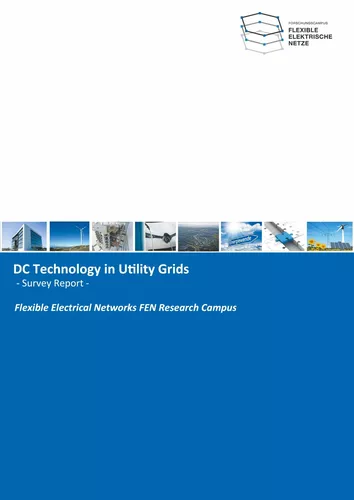
DC Technology in Utility Grids
-Survey Report-
Rik W. De Doncker (Hrsg.), Antonello Monti (Hrsg.), Albert Moser (Hrsg.), Eva-Maria Jakobs (Hrsg.)Paperback
400 Seiten
ISBN-13: 9783946143093
Verlag: Forschungscampus Flexible Elektrische Netze
Erscheinungsdatum: 17.12.2021
Sprache: Englisch
Farbe: Ja
inkl. MwSt. / portofrei
Ihr eigenes Buch!
Werden Sie Autor*in mit BoD und erfüllen Sie sich den Traum vom eigenen Buch und E-Book.
Mehr erfahrenThe aim of FEN is to investigate and to develop flexible power grids. Such grid will safeguard the future energy supply with a high share of fluctuating and decentralized renewable energy sources. At the same time, these grids will enable a reliable and affordable energy supply in the future. The objective is to provide new technologies and concepts for the security and quality of the energy supply in the transmission and distribution grids.
To pursue this goal, the use of direct-current (DC) technology, based on power electronics, automation and communication technologies, plays an important role. Although DC technology is not yet established as a standard technology in the public electrical power supply system, its high potential has been widely recognized. The use of DC is an enabler to make the future energy supply system more economical than a system based on alternating-current (AC), because of its superior properties in handling distributed and fluctuation power generation. Indeed, DC connections are already the most cost-efficient solution in cases of very high-power long-distance point-to-point transmission of electricity or via submarine cables. The objective of the FEN Research Campus is now to achieve and demonstrate feasibility of DC as a standard solution for future electrical grids, as described in this study.

Rik W. De Doncker (Hrsg.)
Univ. Prof. Dr. ir. Dr. h. c. Rik W. De Doncker received his Ph.D. degree (summa cum laude) in electrical engineering from the Katholieke University, Leuven, Belgium in 1986. He was one of the first to implement DSP based field-oriented control for induction machines. In 1987, he went to University of Wisconsin (UW), Madison. Next to lecturing as a Visiting Associate Professor, he researched high-performance induction motor drives at WEMPEC. For the power distribution systems of the NASA space station he invented the dual active bridge dc-to-dc converter, today considered for multi-terminal medium voltage DC systems. In 1988, he joined the General Electric Company Corporate Research and Development Center, Schenectady, NY, leading research on drives and high-power soft-switching converters for aerospace, industrial, and traction applications. He also invented the Auxiliary Resonant Commutated Pole Inverter, offering full PWM modulation at highest efficiency in three-phase systems. From 1994, he has been a Vice President, Technology, at Silicon Power Corporation (formerly GE-SPCO), responsible for high-power converter systems and MOS controlled thyristor devices and the development and production of a 15-kV medium-voltage static transfer switch (MVSTS).
Since 1996, he has been a professor at RWTH Aachen University of Technology (RWTH), Aachen, Germany, leading the Institute for Power Electronics and Electrical Drives. In 2006 he was also appointed director of the E.ON Energy Research Center at RWTH and chair of the Institute for Power Generation and Storage Systems. Currently, together with Prof. Sauer, he leads a team of 115 PhD assistants, researching drives, dc-to-dc converters, PV and wind inverters and battery storage systems for electric vehicles and renewable power sources. In 2014 he was also co-founder and since then director of the Flexible Electrical Networks (FEN) Research Campus at RWTH.
He supervised 42 PhDs and over 300 Master or Dipl.-Ing. theses, published over 900 technical papers and holds more than 200 patents. He is an IEEE Fellow, a member of the EPE and the Flemish Engineering Association (ie-net). He received renowned awards, e.g. the IAS Outstanding Achievements Award (2002), the IEEE Power Engineering Custom Power Award (2008) and the 2020 IEEE Medal in Power Engineering. 2010 till 2020, he was member of the German National Platform for Electromobility. He is a member of the French automotive research institute VEDECOM.

Antonello Monti (Hrsg.)
Univ. Prof. Antonello Monti, Ph.D., received his M.Sc degree (summa cum laude) and his PhD in Electrical Engineering from Politecnico di Milano, Italy in 1989 and 1994 respectively. He started his career in Ansaldo Industria and then moved in 1995 to Politecnico di Milano as Assistant Professor. In 2000 he joined the Department of Electrical Engineering of the University of South Carolina (USA) as Associate and then Full Professor, where he has been Associate Director of the Virtual Test Bed project, which focuses in computational simulation and visualization of modern power distribution system that fully integrate power electronics into the network design. Since 2008 he is the director of the Institute for Automation of Complex Power System, with more than 40 fulltime research associates, within the E.ON Energy Research Center at RWTH Aachen University. He was Coordinator of the EU FP7 project COOPERaTEm and the H2020 project ADMS, and technical manager of the H2020 projects SUCCESS and RE-SERVE. From 2020 he has been technical leader of the H2020 project HYPERRIDE.
He is author or co-author of more than 300 peer-reviewed papers published in international Journals and in the proceedings of International conferences. He is a Senior Member of IEEE, Associate Editor of the IEEE System Journal, Associate Editor of IEEE Electrification Magazine, Member of the Editorial Board of the Elsevier Journal SEGAN and member of the founding board of the Springer Journal "Energy Informatics". In 2017 he received the 2017 IEEE Field Medal Award, Innovation in Societal Infrastructure. Since 2014 he is also a member of the board of Directors of the Flexible Electrical Networks (FEN) Research Campus, of which he has been a co-founder.

Albert Moser (Hrsg.)
Univ.-Prof. Dr.-Ing. Albert Moser studied and received his doctorate in electrical power engineering at RWTH Aachen University before working for Siemens AG in Nuremberg and Minneapolis from 1997 to 2000 in the field of power system control technology and deregulation applications for TSOs/ISOs in the liberalized US market. In 2000, he moved to the European Energy Exchange AG (EEX) in Frankfurt and Leipzig. There he built up the exchange power, gas, CO2 and coal markets as well as the clearing house in a leading position until 2009, before he finally returned to RWTH Aachen University in 2009 as a university professor and head of the Institute for Power Systems and Power Economics (IAEW). At the same time, he took over the task of the board of FGH e.V. from 2009 until 2020. Since 2020, he has been head of the Chair of Transmission Grids and Energy Economics of the Institute for High Voltage Equipment and Grids, Digitalization and Energy Economics, which was formed by the merger of IAEW and the Institute for High Voltage Technology (IFHT). In addition, he is a member of the Scientific Advisory Board for Regulatory Issues of the Federal Network Agency, the Future Council of Westenergie AG, the Advisory Board of RWE AG, the Scientific Advisory and Project Board of 50 Hertz Transmission GmbH, the Supervisory Board of FGH e.V., and the technical-scientific organizations IEEE, CIGRE, VDE, ETG, FNN and DVGW. In 2014 he was one of the co-founders of the Flexible Electrical Networks (FEN) Research Campus. He is member of the FEN Board of Directors.

Eva-Maria Jakobs (Hrsg.)
Prof. Dr. phil. Eva-Maria Jakobs works as Professor for Text Linguistics and Technical Communication at the Institute of Linguistics and Communication Studies at RWTH Aachen University. She is also director of the Human-Computer Interaction Centre at the RWTH Aachen University, and the Institute for Industrial Communication and Business Media. Her research focusses on professional communication and interaction in technology-related contexts and companies; the use, design, and communicative usability of digital media; technology perception and acceptance, and other topics such as age and technology. Eva-Maria Jakobs is an active member of the German Academy of Science and Engineering (acatech). She is active in various national and international specialist societies, editor of several book series and member of the editorial boards of various journals. Starting with its foundation 2014, she is a member of the Board of Directors of the Flexible Electrical Networks (FEN) Research Campus, leading the division Socio-Economics since 2019.









Es sind momentan noch keine Pressestimmen vorhanden.